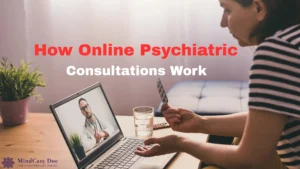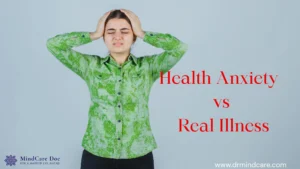We tell ourselves “just five more minutes” – and before we know it, it’s 2am.
Endless scrolling through reels, messages and late-night posts feels harmless, but it
quietly rewires the brain’s ability to rest. The constant glow of screens and mental
stimulation from social media make it difficult to switch off – both mentally and
biologically.
Let’s explore how social media habits affect your sleep cycle – and what science-backed,
psychological and therapeutic solutions can help you finally rest.
Why Social Media Keeps You Awake (Even When You Feel Tired)
Social media platforms are designed to keep you engaged. Every like, comment or
notification releases a small dose of dopamine – the brain’s reward chemical. But this
same chemical makes it difficult to relax when it’s finally time to sleep.
How it disrupts your sleep:
● Blue light from screens delays melatonin, your body’s natural sleep hormone.
● Dopamine stimulation keeps your brain alert and craving more engagement.
● Emotional triggers from social content – comparison, excitement, stress – make it
hard to unwind.
● The brain begins to associate your bed with stimulation, not rest.
This constant digital stimulation can spiral into chronic insomnia, especially when phone
use extends deep into the night.
The Link Between Social Media and Insomnia
1. Blue Light & Circadian Rhythm Disruption
Exposure to blue light at night tricks the brain into believing it’s still daytime.
Melatonin production slows down, delaying your biological clock. The result? You
feel alert long after midnight and wake up groggy.
Studies show that people who spend more than three hours on screens before bed
are nearly twice as likely to report insomnia symptoms.
2. Over-Stimulation and Mental Overload
Every scroll exposes you to new information – notifications, videos, messages.
This mental overload keeps the mind busy and prevents it from entering the calm
pre-sleep state. Over time, this creates a pattern of sleep problems from phone use.
3. Comparison Stress & Anxiety Before Bed
Seeing others “achievements” or “perfect” lives online can cause subconscious
stress and social media anxiety. This emotional activation keeps your sympathetic
nervous system alert – the opposite of what you need for sleep. Many clients who
seek insomnia counselling in Kerala describe this hidden stress as a nightly trigger
for racing thoughts.
4. Sleep Procrastination Habit
Also known as “revenge bedtime procrastination”, this behaviour reflects our
attempt to reclaim personal time after a busy day. It feels good in the moment – but
it fuels late-night scrolling insomnia that damages both mental and physical health.
Signs That Your Phone Use is Affecting Sleep
You might be facing tech-induced insomnia if:
● You feel exhausted even after “sleeping enough hours”.
● You scroll within minutes of waking up or going to bed.
● You can’t fall asleep without checking your phone.
● You experience vivid dreams, racing thoughts or mental fatigue.
● Your work or study performance suffers due to lack of concentration.
If these sound familiar, it’s time to reset both your routine and your mind’s relationship
with screens through digital wellbeing counselling.
What Actually Helps – Evidence – Based Solutions for Better Sleep
1. Digital Sunsets (No Screens 60 Minutes Before Bed)
Commit to a digital sunset – switch off all screens an hour before bedtime.
Try:
● Night mode or blue-light filters.
● Placing your phone in another room.
● Listening to soft music or audiobooks instead of scrolling.
For persistent insomnia, CBT for insomnia (CBT-I) is a gold-standard therapy. It helps
reframe unhelpful sleep thoughts and rebuild a healthy sleep routine.
2. Mindfulness & Relaxation Techniques
Calming your nervous system before bed can dramatically improve sleep quality:
● Deep breathing or guided relaxation.
● Progressive muscle relaxation.
● Short bedtime meditations or gratitude journaling.
These methods are part of Mindfulness Therapy – offered at MindcareDoc to help you
detach from phone-induced overstimulation and gently transition into rest.
3. Creating a Pre-Sleep Ritual
Build a nightly wind-down routine to signal “rest mode” to your body:
● Read a paperback instead of watching reels.
● Sip calming herbal teas
● Do light stretching or a warm bath.
● Keep dinners early and light..
4. Limiting Emotional Triggers Online
Curate what you consume:
● Unfollow stressful or comparison-based accounts.
● Turn off notifications.
● Use screen-time limit apps.
Therapy helps you build emotional boundaries with technology – so your peace isn’t
determined by your feed. Our specialists in insomnia therapy in Kochi combine
behavioral and emotional approaches for long-term change.
How Therapy Helps Break the Cycle of Tech-Induced Insomnia
Even if you reduce screen time, insomnia may persist due to anxious thought patterns and
hyper-alertness. That’s why therapy focuses not just on habits – but the mind behind
them.
At MindcareDoc, we use:
● CBT-I (Cognitive Behavioural Therapy for Insomnia) to retrain your brain for
healthy sleep cues.
● Relaxation Therapy – to calm overactive thought cycles.
● Online Counselling for Sleep Issues – accessible anywhere in Kerala in
Malayalam, English or Hindi.
Our integrated model combines psychological counselling with Ayurvedic sleep support,
offering holistic healing for both body and mind.
Ayurvedic Insights – Balancing Mind & Body for Restful Sleep
Mind-Body Imbalance (Vata Dosha & Restlessness)
In Ayurveda, insomnia (Anidra) often stems from Vata imbalance – linked to
overstimulation, worry and irregular routines. Late-night scrolling aggravates vata dosha,
increasing restlessness and mental chatter.
Calming Practices
● Warm milk with nutmeg
● Foot massage or head massage
● Sip herbal teas
● Early dinner and screen-free evenings
● Meditation and pranayama before bed
These simple rituals help ground the mind and restore the body’s natural rhythm. Many
patients who combine Ayurvedic remedies for insomnia in Kerala with counselling report
faster and deeper improvements.
Integrative Healing at MindcareDoc
Our practitioners believe true rest is both physical and mental. That’s why our care
combines Ayurvedic therapies (to relax the nervous system) with psychotherapy (to
manage thought patterns).
This dual approach addresses both social media anxiety and sleep disturbances – helping
you find calm that lasts.
Practical Tips to Try Tonight
● Keep your phone outside your bedroom.
● Use a paperback book instead of late-night reels.
● Maintain consistent sleep and wake times.
● Avoid caffeine after 6pm
● Journal your worries before bed.
These steps improve rest – but lasting results often need professional guidance through
counselling or structured therapy.
How MindcareDoc Helps You Sleep Better (and Scroll Less)
At MindcareDoc, we combine psychiatric expertise, behavioural therapy and Ayurvedic
support to treat insomnia caused by stress or digital overuse.
Whether you’re dealing with screen time sleep problems in Kerala, late-night scrolling
insomnia or emotional burnout, our team helps you rebuild a calm, healthy sleep rhythm.
We offer in-person sessions in Kochi, Trivandrum and Alappuzha, along with online
counselling across Kerala – available in Malayalam, English and Hindi.






